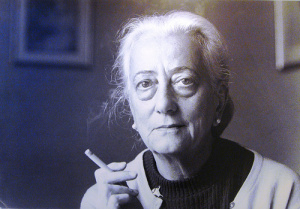Anna Murià facts for kids
Quick facts for kids
Anna Murià
|
|
|---|---|
 |
|
| Born | 21 April 1904 Barcelona, Spain |
| Died | 27 September 2002 (aged 98) Terrassa, Spain |
| Pen name | Romaní |
| Language | Spanish |
| Nationality | Spanish |
| Genre | translator, literary critic, and journalist |
| Literary movement | Grup Sindical d'Escriptors Catalans |
| Spouse | Agustí Bartra |
Anna Murià i Romaní (born April 21, 1904 – died September 27, 2002) was an important Spanish writer from Catalonia. She was known for writing short stories, novels, and books for children. Anna was also a translator, a literary critic (someone who reviews books), and a journalist. She used the pen name Romaní.
Anna Murià was also a strong supporter of women's rights. She helped start the Grup Sindical d'Escriptors Catalans (Union Group of Catalan Writers) in 1936. She was also an honorary member of the Associació d'Escriptors en Llengua Catalana, which is an association for writers who write in the Catalan language.
Early Life
Anna Murià was born in Barcelona, a big city in Spain. Her father, Magí Murià i Torner, was a journalist and filmmaker. Anna went to religious schools when she was young. Later, from 1918 to 1924, she studied business, accounting, and English at a special institute called the l'Institut de Cultura i Biblioteca de la Dona.
Her Career and Activism
Anna Murià was a very active writer and political figure. She first joined a group called Acció Catalana. In 1932, she became a member of the Esquerra Republicana de Catalunya (Republican Left of Catalonia), a political party. She helped gather signatures to support a special law called the Statute of Autonomy of 1932. This law gave more self-governance to Catalonia.
In 1932, Anna also helped create the "Front Únic Femení Esquerrista" (United Front of Women from the Left). She worked with other important women writers and activists like Rosa Maria Arquimbau to do this. In 1936, she joined the main committee of the Estat Català, another political group. Anna Murià was also a member of El Club Femení i d'Esports de Barcelona, a women's club for sports and other activities.
During the Spanish Civil War, Anna worked for the Generalitat de Catalunya (the government of Catalonia). She was the secretary of the Institució de les Lletres Catalanes (Institute of Catalan Letters). She also wrote for many newspapers and magazines like La Dona Catalana, La Rambla, La Nau, Meridià, and Diari de Catalunya. She was a member of the Women's Union of Catalonia and helped start the Union Group of Catalan Writers.
Anna Murià wrote many novels. Her book Aquest serà el principi ("This will be the Beginning"), published in 1986, is thought to be her most important work.
Personal Life
Anna Murià met her husband, the poet Agustí Bartra, in 1939. Because of the Spanish Civil War, they had to leave Spain and live in exile. They traveled to places like the Dominican Republic, Cuba, and Mexico before they could return to Catalonia.
Anna and Agustí had two children. Their son, Roger Bartra, became an anthropologist (someone who studies human societies and cultures). Their daughter, Eli Bartra, became a philosopher (someone who studies big questions about life and knowledge). Anna Murià passed away in Terrassa, Spain, in 2002. She was also a close friend of another famous writer, Mercè Rodoreda.
Selected Works
- Joana Mas (1933)
- La peixera (1938)
- La revolució moral (1934)
- El 6 d'octubre i el 19 de juliol (1937)
- Via de l'est (1946)
- El nen blanc i el nen negre (1947)
- Crònica de la vida d'Agustí Bartra (1967)
- L'obra de Bartra (1975)
- El meravellós viatge de Nico Huehuetl a través de Mèxico (1974, Josep Maria Folch i Torres prize)
- A Becerola fan ballades (1978)
- Pinya de contes (1982)
- El país de les fonts (1980)
- El llibre d'Eli (1982)
- Res no és veritat, Alícia (1984)
- Cartes a l'Anna Murià (1985)
- Aquest serà el principi (1986)
- Quatre contes d'exili (2002)
- Reflexions de la vellesa (2003)
See also
 In Spanish: Anna Murià para niños
In Spanish: Anna Murià para niños
 | Lonnie Johnson |
 | Granville Woods |
 | Lewis Howard Latimer |
 | James West |

